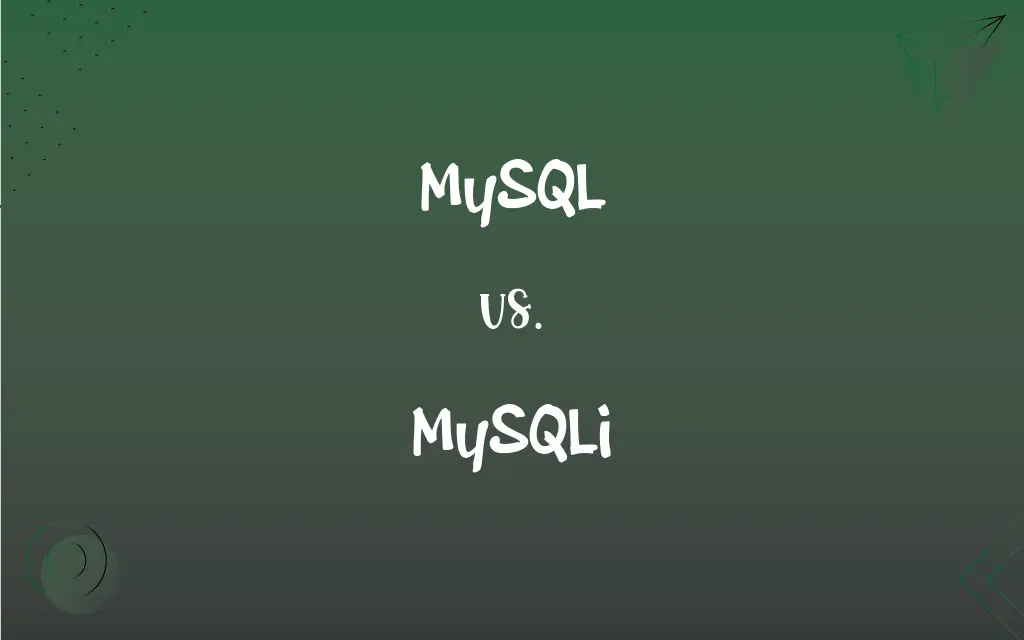MySQL vs. MySQLi: What's the Difference?
Edited by Aimie Carlson || By Janet White || Published on May 28, 2024
MySQL is a relational database management system, while MySQLi is a PHP extension to interact with MySQL databases.

Key Differences
MySQL and MySQLi represent two critical components in web development, particularly in database management and data access. MySQL is a popular open-source relational database management system, widely used for storing and managing data in structured formats. On the other hand, MySQLi stands for "MySQL Improved," a PHP extension designed to provide efficient access to MySQL databases.
MySQL focuses on the database aspect, offering features like data storage, indexing, and querying, while MySQLi provides specific functions in PHP to connect to a MySQL database, execute queries, and handle the database operations within PHP scripts.
MySQL's role is to serve as the backend storage mechanism, whereas MySQLi acts as the bridge between a PHP application and a MySQL database. This distinction is crucial for developers, as MySQL lays the foundation for data management, while MySQLi offers the tools necessary to interact with that data dynamically in web applications.
Comparison Chart
Nature
Relational database management system
PHP extension for using MySQL databases
Usage
Data storage and management
Database operations in PHP
ADVERTISEMENT
Connection
Used independently of PHP
Specifically designed for PHP
API
Procedural (in PHP context)
Both procedural and object-oriented
Feature Set
Database management and manipulation
Enhanced MySQL database interaction
MySQL and MySQLi Definitions
MySQL
Used for web database solutions due to its reliability and ease of use.
Our website's backend relies on MySQL for storing all the content and user information.
MySQLi
A PHP extension designed for database interactions with MySQL databases.
I used MySQLi to connect my PHP application to the MySQL database seamlessly.
ADVERTISEMENT
MySQL
Can be used with various programming languages, not limited to PHP.
We integrate our Python-based application with a MySQL database for data storage.
MySQLi
Supports both procedural and object-oriented programming, offering flexibility in usage.
For my project, I preferred using MySQLi's object-oriented approach for database operations.
MySQL
An open-source relational database management system.
We store all our user data in a MySQL database for easy management.
MySQLi
Provides improved security features like prepared statements to prevent SQL injection.
We use MySQLi prepared statements to enhance our application's security against SQL injection attacks.
MySQL
Supports various data types, making it versatile for different data storage needs.
MySQL's support for diverse data types allows us to store everything from text to binary content.
MySQLi
Capable of handling multiple database connections within a single PHP script.
With MySQLi, managing multiple database connections in our script became straightforward.
MySQL
Features include stored procedures, triggers, and views for complex data operations.
We utilize MySQL triggers to automate certain tasks within the database.
MySQLi
Includes enhanced debugging capabilities for easier error handling and troubleshooting.
MySQLi's improved error reporting helped us debug our database queries more efficiently.
FAQs
What is MySQL?
MySQL is an open-source relational database management system (RDBMS) based on SQL (Structured Query Language).
What is MySQL used for?
MySQL is used for a variety of applications, particularly for web databases, data warehousing, e-commerce, and logging applications.
How does MySQL store data?
MySQL stores data in tables which are organized into databases. Each table has rows (records) and columns (attributes).
Who developed MySQL?
MySQL was originally developed by MySQL AB, a Swedish company founded by David Axmark, Allan Larsson, and Michael Widenius.
Is MySQL free?
Yes, MySQL is free and open-source, available under the GNU General Public License.
What programming languages support MySQL?
MySQL can be used with numerous programming languages, including PHP, Python, Java, C++, and Ruby.
How is data accessed in MySQL?
Data in MySQL is accessed using SQL queries, which can retrieve, insert, update, and delete data.
Does MySQLi support prepared statements?
Yes, MySQLi supports prepared statements, which enhance security and efficiency by separating SQL logic from the data.
Is MySQL secure?
MySQL includes several security features, such as encrypted connections and password hashing, but security also depends on proper configuration and maintenance.
Why use MySQLi over MySQL?
MySQLi provides an object-oriented interface, support for prepared statements, and enhanced debugging capabilities over the older MySQL extension.
How does MySQLi handle errors?
MySQLi can handle errors using exceptions or explicit error checking, depending on the programmer’s preference.
Does MySQLi support asynchronous queries?
Yes, MySQLi supports asynchronous queries, allowing for non-blocking operations in PHP applications.
Does MySQL support transactions?
Yes, MySQL supports transactions, allowing for safe data modifications by ensuring all operations within a transaction are completed successfully before committing.
Is MySQLi faster than MySQL?
MySQLi can offer performance improvements, especially with prepared statements, but overall speed depends on how it's used in the application.
How is MySQLi installed?
MySQLi is typically included in PHP distributions. Ensure it's enabled in your PHP configuration (php.ini).
Can MySQL handle large databases?
Yes, MySQL can efficiently handle large databases with many tables and millions of rows.
How do I choose between MySQLi and PDO?
Choose MySQLi for MySQL-specific features and an object-oriented or procedural interface; choose PDO if you need database flexibility or are working with multiple database types.
Can MySQLi connect to other database systems?
No, MySQLi is designed specifically for MySQL databases and cannot directly interact with other RDBMS systems.
Can MySQLi only be used with PHP?
Yes, MySQLi is specifically designed as a PHP extension for use with MySQL databases.
What is MySQLi?
MySQLi stands for MySQL Improved, a PHP extension designed to work with MySQL databases, offering an improved API.
About Author
Written by
Janet WhiteJanet White has been an esteemed writer and blogger for Difference Wiki. Holding a Master's degree in Science and Medical Journalism from the prestigious Boston University, she has consistently demonstrated her expertise and passion for her field. When she's not immersed in her work, Janet relishes her time exercising, delving into a good book, and cherishing moments with friends and family.
Edited by
Aimie CarlsonAimie Carlson, holding a master's degree in English literature, is a fervent English language enthusiast. She lends her writing talents to Difference Wiki, a prominent website that specializes in comparisons, offering readers insightful analyses that both captivate and inform.






































































